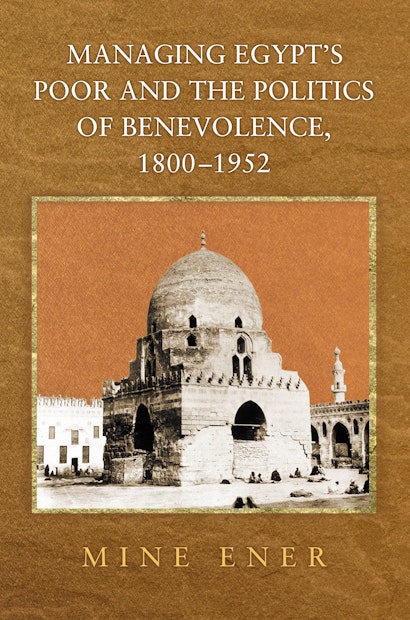This richly textured social history recovers the voices and experiences of poor Egyptians—beggars, foundlings, the sick and maimed—giving them a history for the first time. As Mine Ener tells their fascinating stories alongside those of reformers, tourists, politicians, and philanthropists, she explores the economic, political, and colonial context that shaped poverty policy for a century and a half.
While poverty and poverty relief have been extensively studied in the North American and European contexts, there has been little research done on the issue for the Middle East—and scant comprehensive presentation of the Islamic ethos that has guided charitable action in the region. Drawing on British and Egyptian archival sources, Ener documents transformations in poor relief, changing attitudes toward the public poor, the entrance of new state and private actors in the field of charity, the motivations behind their efforts, and the poor’s use of programs created to help them. She also fosters a dialogue between Middle Eastern studies and those who study poverty relief elsewhere by explicitly comparing Egypt’s poor relief to policies in Istanbul and also Western Europe, Russia, and North America.
Heralding a new kind of research into how societies care for the destitute—and into the religious prerogatives that guide them—this book is one of the first in-depth studies of charity and philanthropy in a region whose social problems have never been of greater interest to the West.
Mine Ener was Associate Professor of Modern Middle East History and Islamic Civilization at Villanova University. She was a coeditor of Poverty and Charity in Middle Eastern Contexts.
"This book, written by the late Mine Ener, is one of the first detailed social histories of charity and philanthropy in the Middle East. . . . By drawing on British and Egyptian archival material, Ener documents the changes in poor relief, changing attitudes to the public poor, and the emergence of new state and private actors in the field of charity, the motivations behind the efforts and the poor use of the programs created to help them."—Rehan Jamil, Middle East Journal
"At a time when attention is newly focused on social problems in the Middle East, Ener's book examines poor relief in Egypt over the course of a century and a half. While many have spoken about the need to write history 'from below,' she shows how this ought to be done. In the process, she retrieves the stories of Egyptian men and women, giving the poor faces and names within a narrative that is clear, accessible, and polished."—Beth Baron, City College and Graduate Center, City University of New York
"Ener's book sits on the crest of a new wave of poverty/charity studies in Middle Eastern history. Among its most innovative features is its use of Egyptian police archives alongside literary sources that round out and give context to this fascinating data. The book also relates poverty and poor relief to larger issues of modern Egyptian history: state-building, national consciousness, modernization, colonialism, democratization, associational life, the role of religion in charity, and the role of women in society."—Mark Cohen, Princeton University
"In this thorough and imaginative study, Ener examines the treatment of the destitute in a Middle Eastern country. Placing charity in a broad context, she shows how philanthropic enterprises became political instruments, how state and private charity interacted, and how poor people used the institutions provided for their care and discipline. Her book raises questions of wide interest and will appeal to historians of poor relief in any society."—Brian Pullan, University of Manchester

